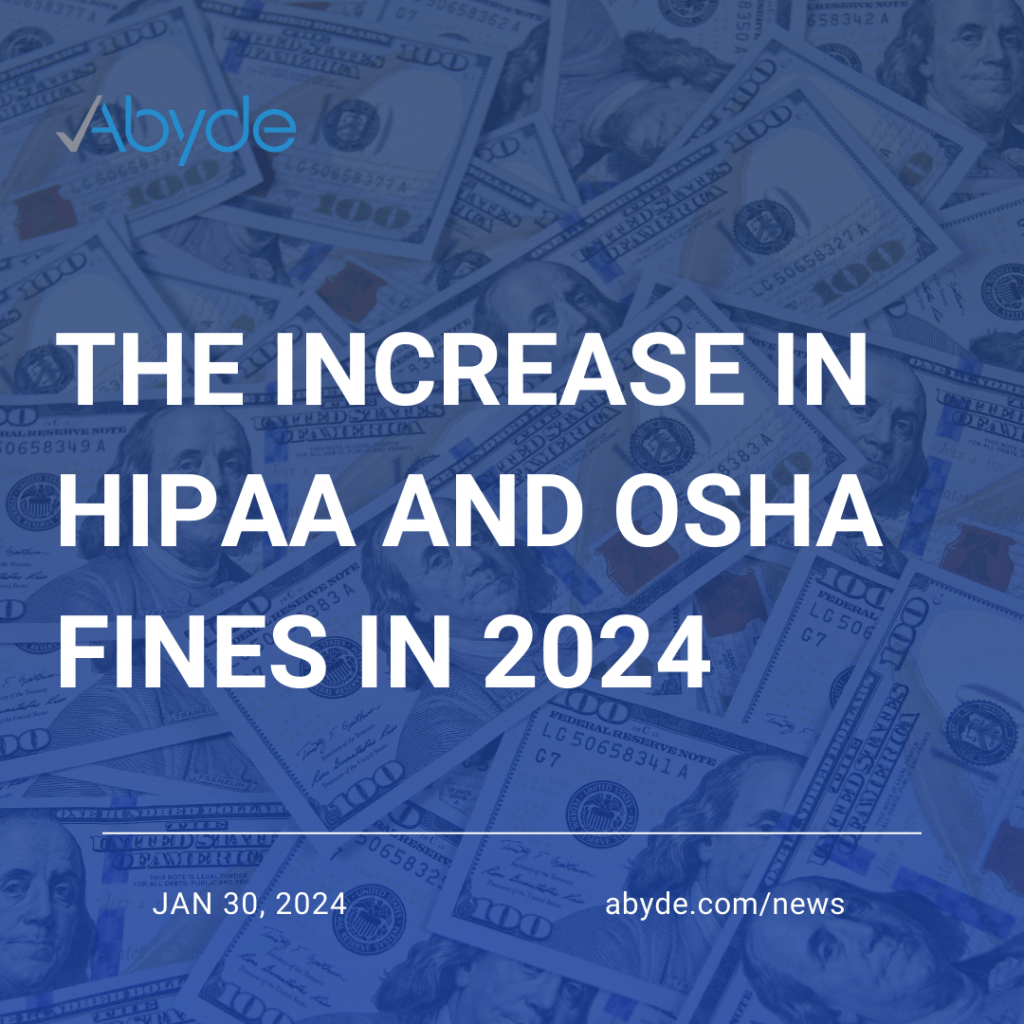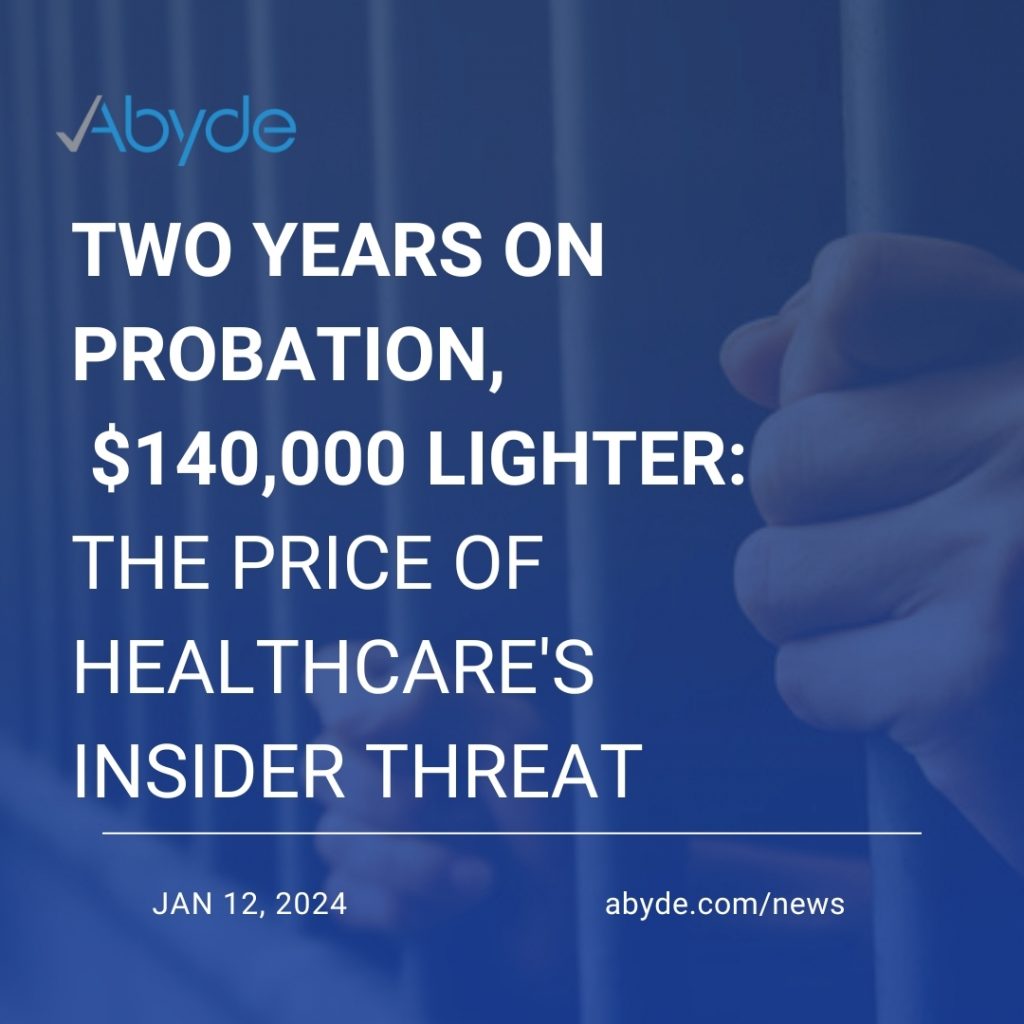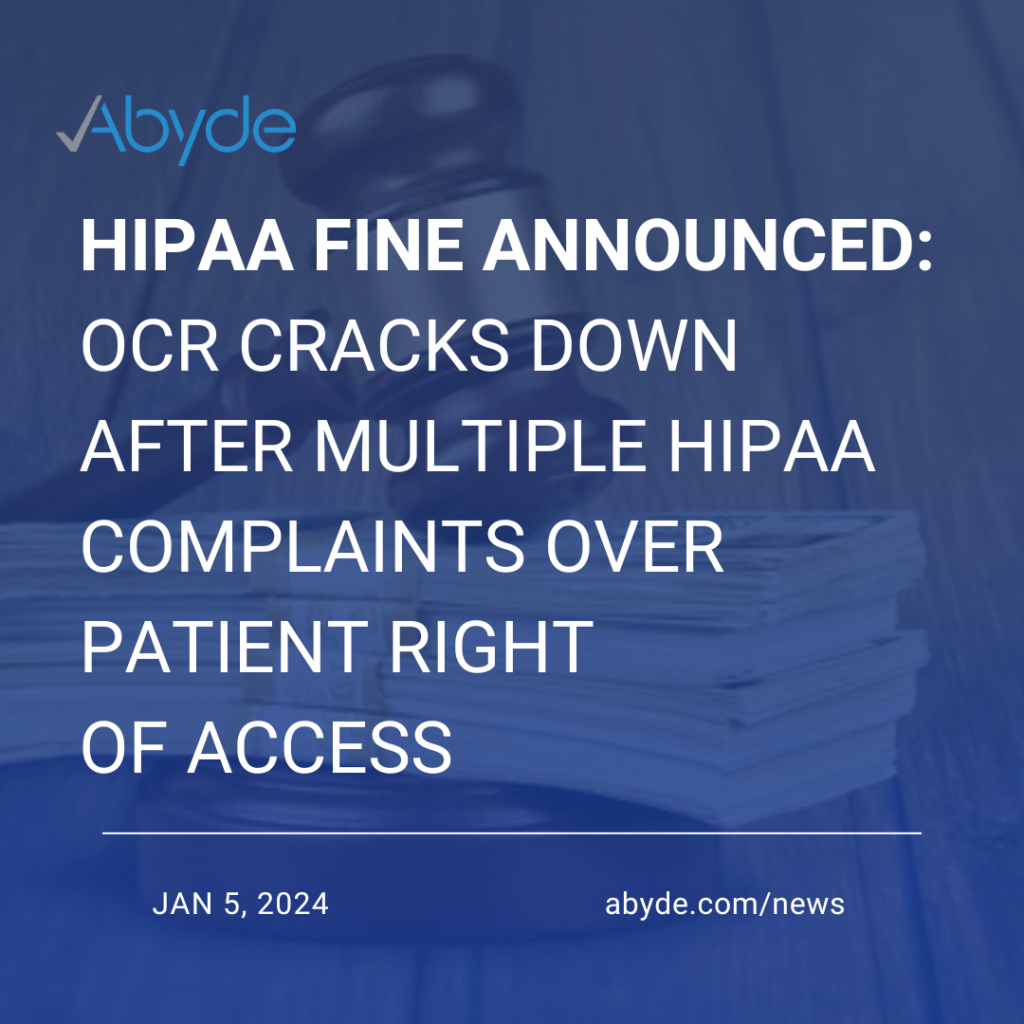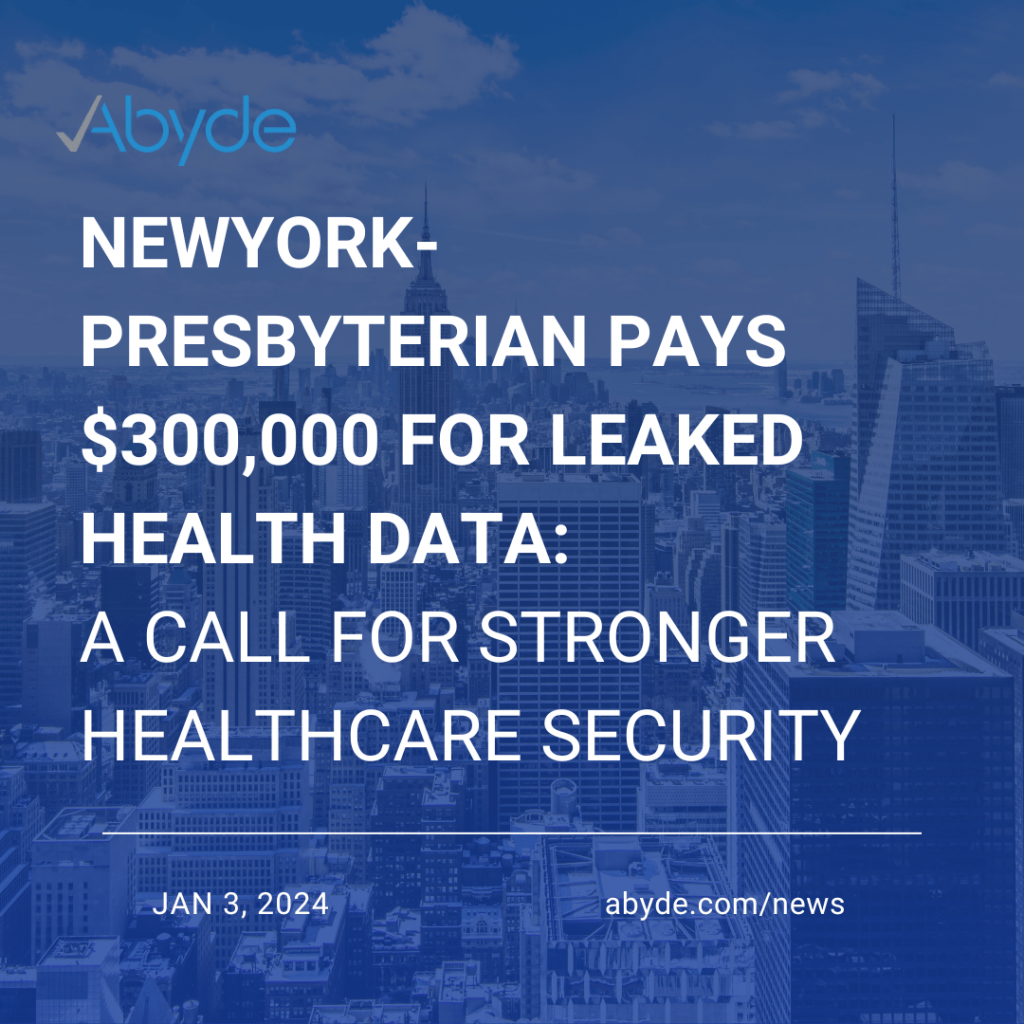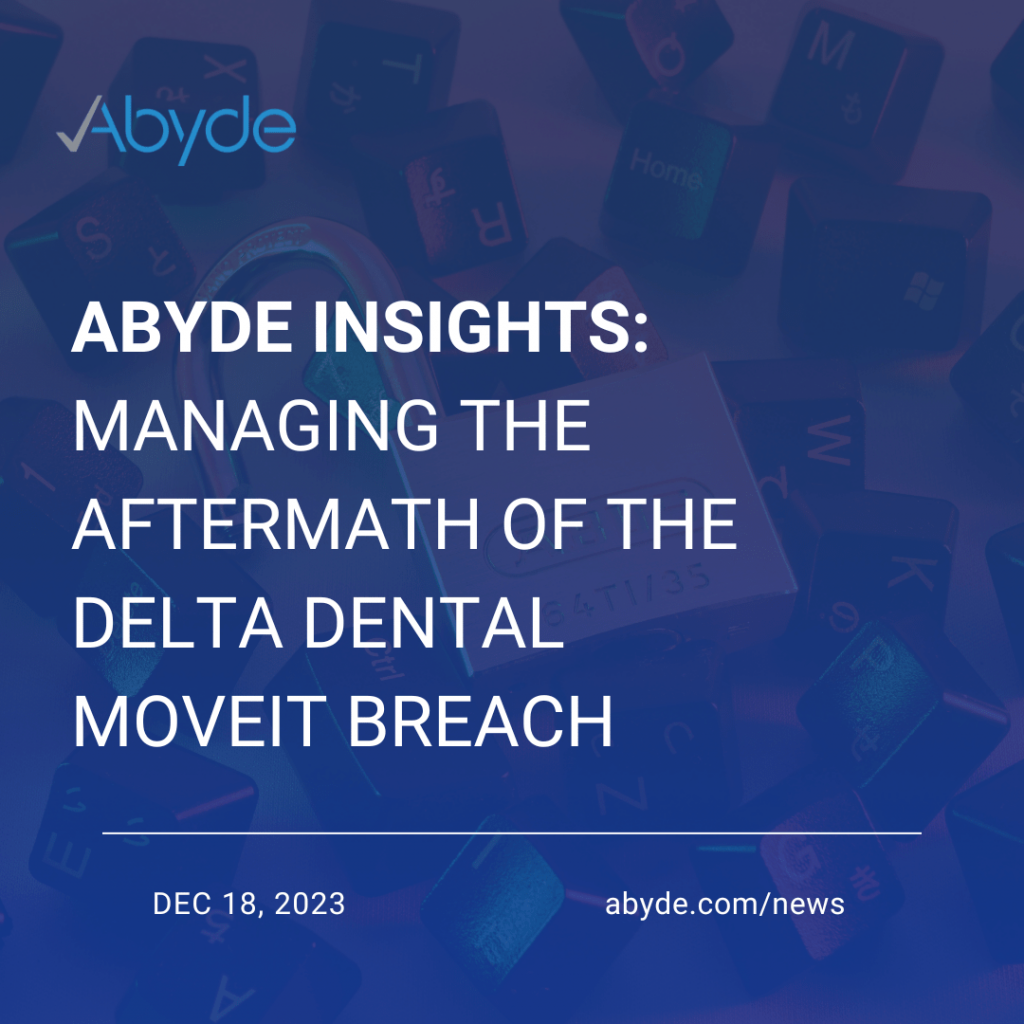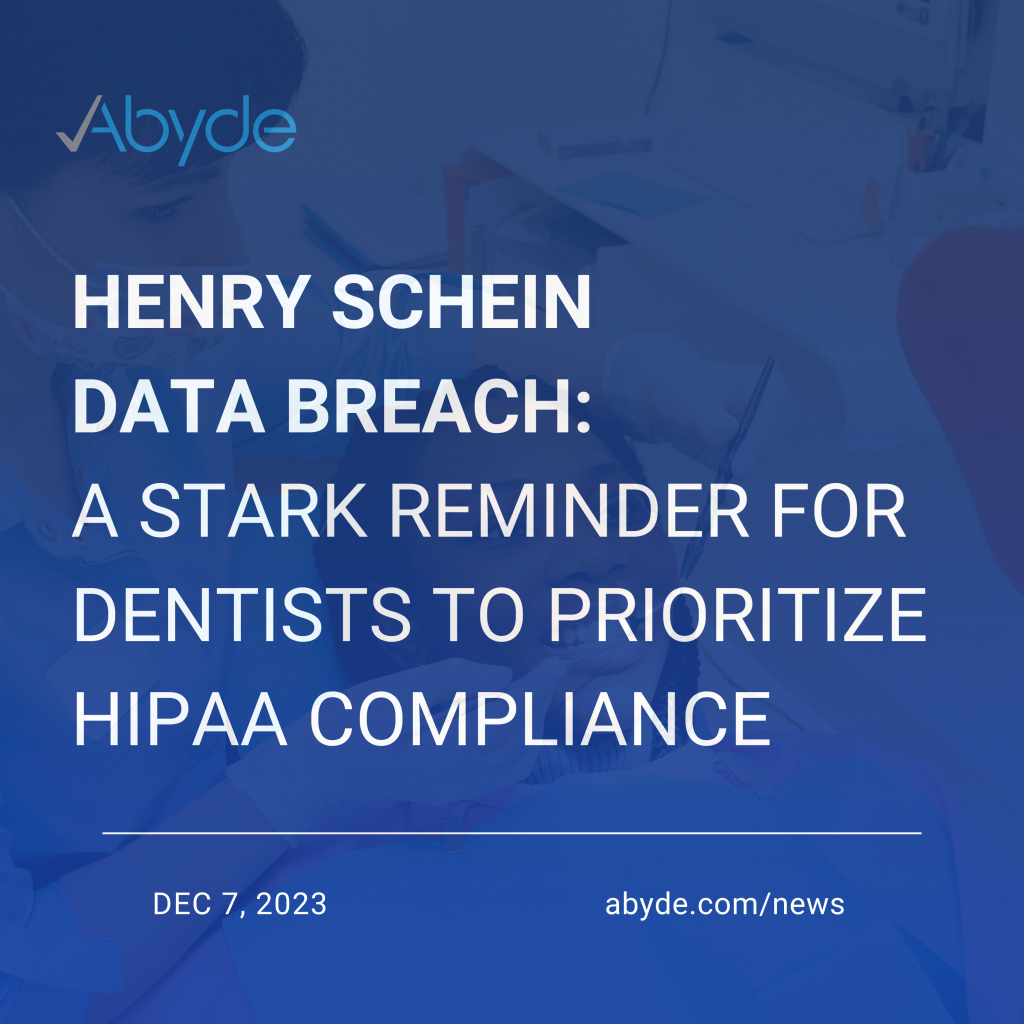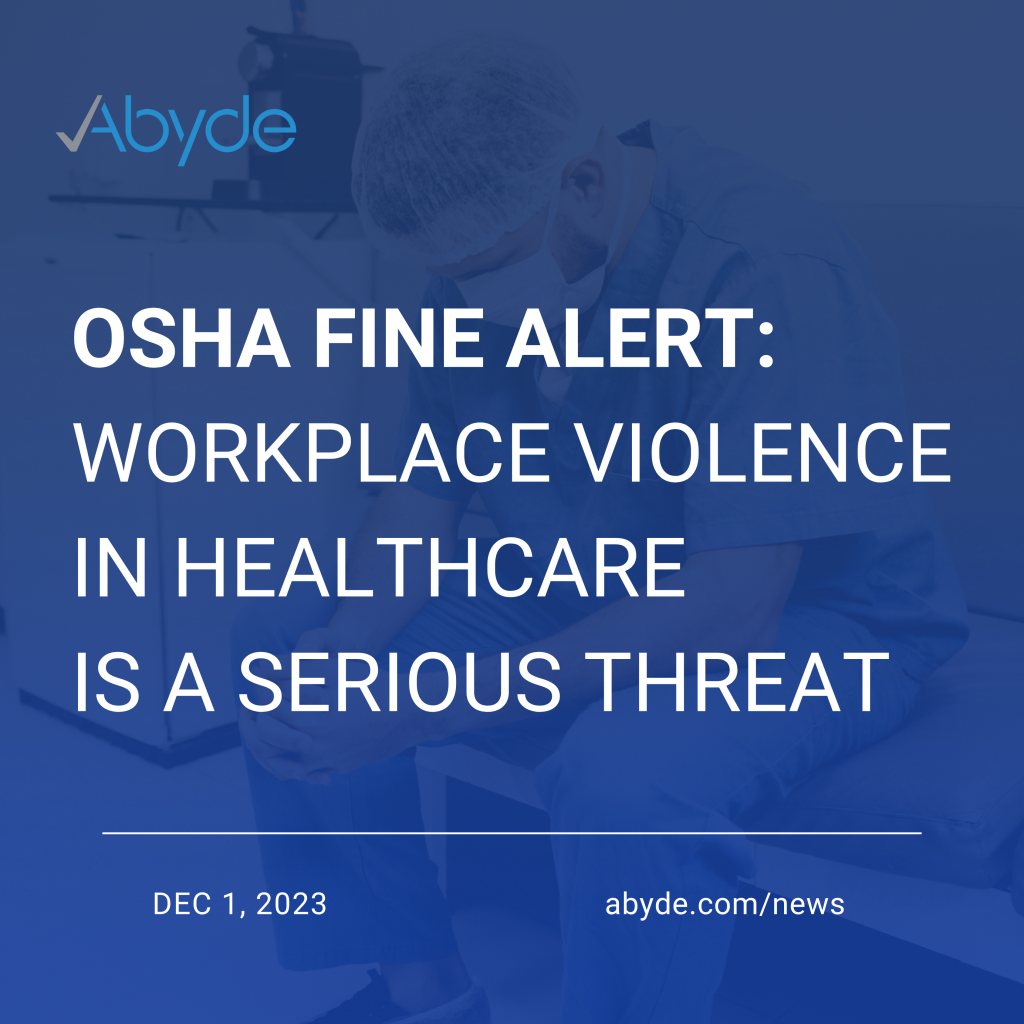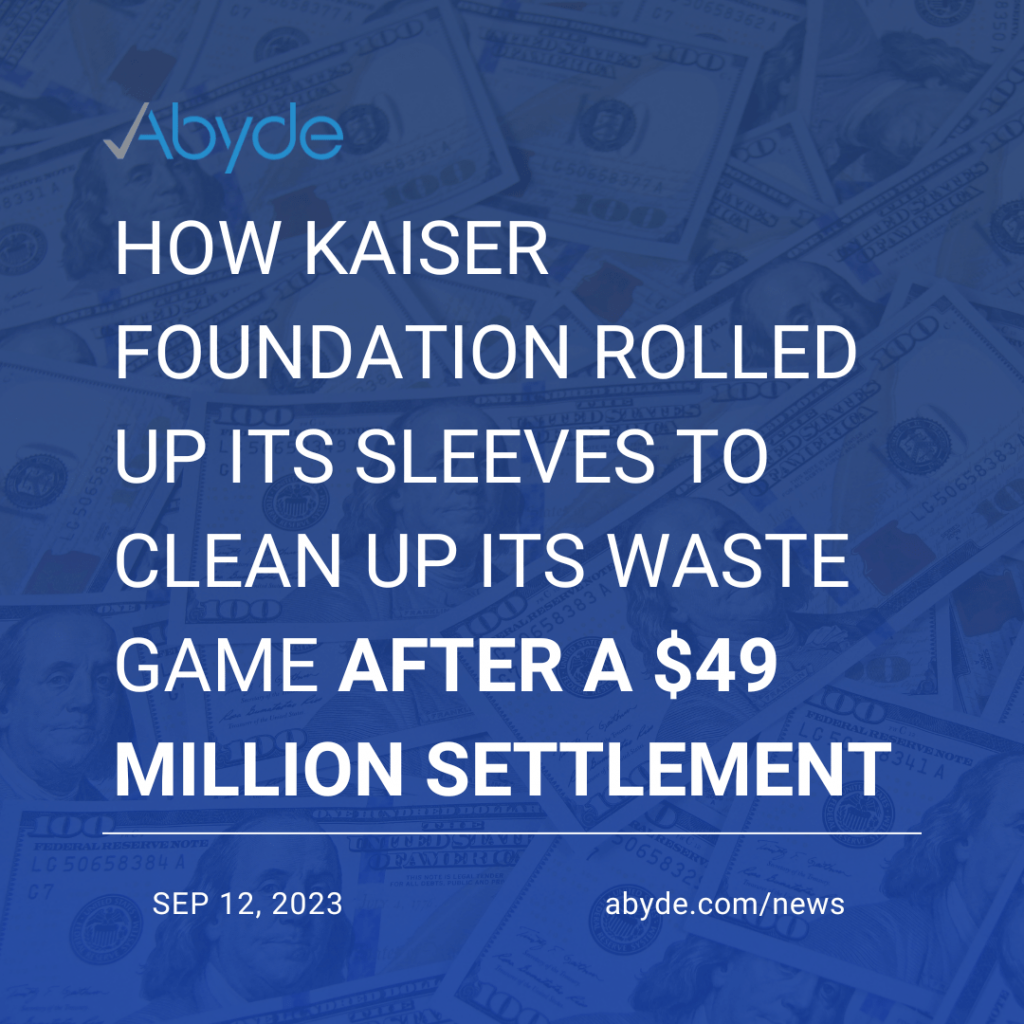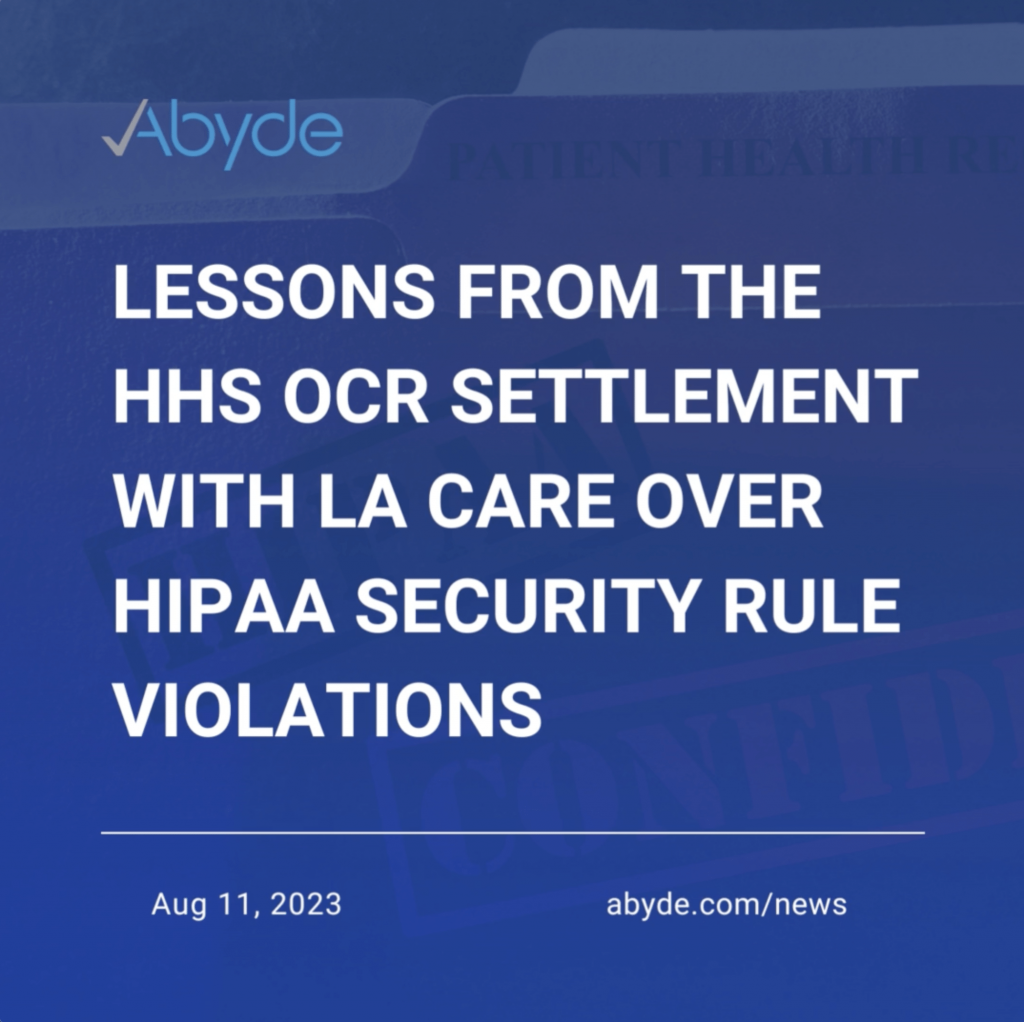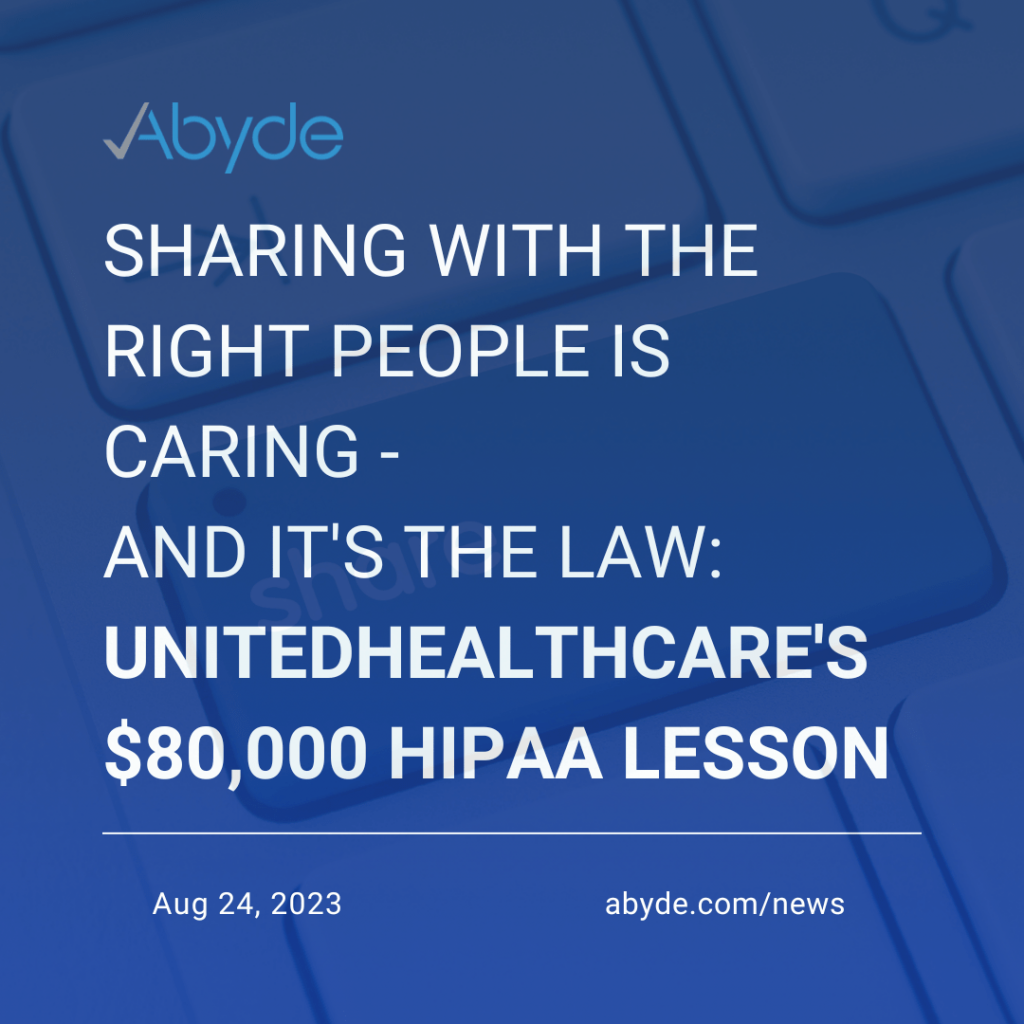January 30, 2024 Well, my compliance crew, the cost of noncompliance just went up. As we all know, the costs of a HIPAA or OSHA violation can be detrimental to a practice. 2024 is bringing some hefty new financial burdens for organizations responsible for protecting patient privacy and worker safety. Buckle up, because increased fines for HIPAA and OSHA violations are here, and they’re not messing around. HIPAA: Your Data, Your Dollars The Department of Health and Human Services (HHS) has adjusted HIPAA civil monetary penalties for inflation, effective January 1st, 2024. This means: The message is clear: protecting patient privacy is more important than ever, and the government is willing to put its money where its mouth is. It’s time for healthcare providers and covered entities to beef up their data security measures and HIPAA compliance training. OSHA: Safety First, Fines Second OSHA hasn’t been shy about increasing its civil monetary penalties either, effective January 17th, 2024. Here’s the breakdown: These adjustments reflect the rising cost of workplace injuries and illnesses. Businesses across all industries need to prioritize safety protocols and employee training to avoid these financial penalties and potential lawsuits. Who Feels the Pinch? These increased fines impact various stakeholders: The Bottom Line: The 2024 fine hikes for HIPAA and OSHA violations are a wake-up call for organizations. While the financial implications are significant, neglecting compliance can be far costlier in terms of reputational damage, legal repercussions, and potential harm to individuals. That’s where Abyde can help your practice and organization. Abyde’s software can simplify compliance for you, with our software including training, risk assessments, dynamically generated policies and more. By proactively addressing these regulations, organizations can create a safer and more secure environment for everyone involved. Remember, compliance isn’t just about avoiding fines; it’s about building trust and protecting what matters most. So, be a compliance champion, not a cautionary tale. Make 2024 the year of safety, security, and peace of mind! To learn more about what you need to do to be compliant, email us at info@abyde.com and set up an educational consultation here.
Two Years on Probation, $140,000 Lighter: The Price of Healthcare’s Insider Threat
January 12, 2024 Two Years on Probation, $140,000 Lighter: The Price of Healthcare’s Insider Threat A former healthcare executive in Kentucky has been sentenced to probation and ordered to pay restitution after admitting to disclosing patients’ protected health information (PHI) in violation of HIPAA. This case highlights the ongoing threat of insider data breaches in the healthcare industry and the importance of strong data security measures. The Case: Mark Kevin Robison, a former vice president at Commonwealth Health Corporation (now Med Center Health), pleaded guilty to knowingly disclosing PHI of patients under false pretenses to an unauthorized third party between 2014 and 2015. While details of the unauthorized disclosure remain unclear, the incident underscores the potential harm caused by insider data breaches within healthcare organizations. Avoiding Jail, Facing Consequences: Despite facing a potential five-year prison sentence and a $100,000 fine, Robison’s plea deal secured him two years of probation and a $140,000 restitution to the hospital. Half of the restitution has already been paid, and Robison is expected to cover the remaining amount by the end of January. Lessons Learned: The Robison case serves as a stark reminder of the importance of data security in healthcare. Healthcare organizations must: Insider Threats Remain a Challenge: While HIPAA violations by external hackers often grab headlines, insider threats like the Robison case pose a significant and often underestimated risk. Healthcare organizations must prioritize data security measures that take into account both external and internal threats. Looking Ahead: This case should serve as a wake-up call for healthcare organizations to redouble their efforts to protect patient data. By prioritizing data security and creating a culture of compliance, healthcare providers can help ensure that patients’ personal information remains safe and secure. To learn more on how to ensure your practice is compliant, email info@abyde.com and schedule an educational consultation.
HIPAA Fine Announced: OCR Cracks Down After Multiple HIPAA Complaints Over Patient Right of Access
January 5, 2024 Patients at Optum Medical Care in New Jersey and Connecticut had a frustrating experience: waiting months for their medical records. They requested their records, as guaranteed by the Health Insurance Portability and Accountability Act (HIPAA), but Optum dragged its feet for months, far beyond the 30-day legal limit. Fed up with the delays, several patients filed complaints with the Office for Civil Rights (OCR). The OCR investigated and found that Optum had indeed violated the law. As a consequence, Optum has been slapped with a $160,000 fine and ordered to implement a corrective action plan to speed up the record-sharing process. This case is a reminder of two important things: This case is also the 46th enforcement action taken by the OCR under its Right of Access Initiative, highlighting the importance of timely access to medical records for patients across the country. Abyde: Your Partner in HIPAA Compliance At Abyde, we recognize the stress practices undergo trying to stay in compliance. We remain committed to supporting practices in navigating the complexities of HIPAA compliance, with a specific emphasis on the importance of providing patients medical records within the allotted time frame. Contact Abyde today at info@abyde.com and set up a demo to see why Abyde is considered the pre-eminent HIPAA compliance solution.
NewYork-Presbyterian Pays $300,000 for Leaked Health Data: A Call for Stronger Healthcare Security
January 3, 2024 At Abyde, we’re always tuned into the importance of keeping health info safe and sound. So, when we heard about what happened at NewYork-Presbyterian Hospital (NYP), you can bet we were listening. The big news? New York’s Attorney General Letitia James announced a whopping $300,000 settlement with NYP. This was a major letdown in the world of HIPAA compliance, revealing some serious gaps in how they were handling patient privacy and protected health information (PHI). Here’s the lowdown: Patients using NYP’s website to look for healthcare services got more than they bargained for. Unbeknownst to them, advertising tools were tracking their online moves, and sending information to third parties. Talk about a breach of trust, especially when we’re dealing with sensitive health info! This whole fiasco reminds us just how crucial HIPAA compliance is. It wasn’t just some tech glitch at NYP; it was a broken promise to keep patient data secure. This shows that following HIPAA rules isn’t just ticking a box; it’s a super important, continuous part of healthcare operations, needing tight controls and constant vigilance. The fallout from this kind of breach? Huge. We’re talking about identity theft, discrimination, and other nasty stuff that could hurt patients. It’s a stark reminder to healthcare folks that patient data isn’t just some digital file; it’s a deeply personal and private matter that deserves the utmost respect and protection. So, what’s the takeaway from NYP’s settlement? It’s just the start of a much bigger journey towards really valuing patient privacy rights. This incident should be a loud wake-up call for the healthcare industry to take a hard look at how they manage patient data, ensuring they stick to data protection laws and honor the dignity and privacy of the information patients trust. At Abyde, we’re all about compliance and keeping sensitive info safe. We see this moment as a chance for some serious thinking and action to make healthcare more secure and respectful of privacy. Let’s use the NYP breach as a lesson in what can happen if patients’ data isn’t secured properly. For more information about Abyde, email info@abyde.com and click here to schedule a demo of our revolutionary software solution.
Abyde Insights: Managing the Aftermath of the Delta Dental MOVEit Breach
December 18, 2023 In the ever-evolving landscape of cybersecurity, vigilance is key. Recently, Delta Dental of California faced the brunt of a cyberattack, highlighting the imperative need for robust security measures. At Abyde, we believe in keeping our community informed to fortify defenses against potential threats. Here’s a closer look at the Delta Dental MOVEit breach and insights on strengthening your cybersecurity posture. Understanding the Breach Delta Dental of California, an esteemed provider of dental insurance to 45 million individuals, fell victim to the Clop hacking group’s exploitation of a zero-day vulnerability in Progress Software’s MOVEit Transfer solution. This breach, affecting a staggering 6,928,932 dental plan members, underscores the critical importance of cybersecurity in safeguarding sensitive information. Timeline of Events The breach unfolded when Delta Dental identified an SQL injection vulnerability (CVE-2023-34362) in MOVEit Transfer on June 1, 2023. Despite Progress Software swiftly releasing an emergency patch on May 31, 2023, the Clop group had exploited the flaw between May 27 and May 30, 2023. The aftermath saw unauthorized access and data exfiltration from Delta Dental’s MOVEit server. Response and Analysis Delta Dental responded promptly, engaging third-party computer forensics experts to conduct a thorough analysis. The complexity of the breach required meticulous scrutiny, leading to the finalization of the affected individuals and data types on November 27, 2023. Notification letters commenced distribution on December 14, 2023. Protective Measures for Affected Individuals In an effort to mitigate the impact on affected individuals, Delta Dental has taken proactive steps. Those affected are being offered 24 months of complimentary credit monitoring and identity theft protection services. This measure aims to empower individuals to monitor and protect their personal information during this challenging time. Learning from the Incident While Delta Dental emphasized that this was a mass exploitation incident affecting numerous companies, the magnitude of the breach sets it apart. With nearly 7 million individuals affected, it stands as the third-largest healthcare MOVEit-related breach reported. HIPAA Compliance and Notification Delta Dental adhered to the HIPAA Breach Notification Rule, reporting the breach to the HHS’ Office for Civil Rights on September 6, 2023, within the stipulated 60-day timeframe. The intricate process of identifying affected individuals and data involves digital forensic and incident response providers, highlighting the complexities of incident response. At Abyde, we advocate for a proactive approach to cybersecurity and compliance. Regularly updating and patching software, conducting comprehensive risk assessments, and fostering a culture of compliance are crucial components of a resilient HIPAA compliance strategy. Abyde is here to guide you on your journey to enhanced security and privacy. Reach out to one of our experts today to learn more! Call 800.594.0883 or email info@abyde.com.
Dissecting the Henry Schein Data Breach: A Stark Reminder for Dentists to Prioritize HIPAA
December 11, 2023 In October 2023, Henry Schein, a major dental supply distributor, suffered a significant data breach. The ransomware attack compromised sensitive information belonging to both patients and dental practices, including names, addresses, Social Security numbers, and financial information. This incident serves as a stark reminder for dentists of the importance of taking data security and compliance seriously. Key Takeaways from the Henry Schein Data Breach: Mitchell Rubinstein DMD, a practicing dentist and noted cybersecurity educator in New York City is hoping this is the wakeup call that dental professionals need to start taking cybersecurity and HIPAA seriously. “An important thing to learn from the Henry Schein breach is that everyone is vulnerable. They’re a multibillion dollar healthcare corporation with far greater resources than any dental practice. If they can fall victim to a cyberattack, then so can any of us.” He went on to add, “Having a plan in place to respond to a cyberattack is just as important as having a plan to prevent one.” What dentists can do to protect their practices: “The companies we do business with accumulate a great deal of information about us,” Dr. Rubinstein stated. “If that information is compromised in a cyberattack, it can result in several layers of harm, not only to us, but to our patients as well.” Abyde: Your Partner in Cybersecurity and Compliance Abyde understands the importance of data security and compliance for dental practices. We offer a comprehensive solution designed to help protect you from data breaches and audits while also helping you ensure HIPAA compliance. Our solution includes: By taking data security and compliance seriously, dentists can help prevent data breaches, protect their patients, and avoid legal ramifications. Let’s work together to create a safer environment for everyone involved in dental care. Contact Abyde today to learn more about our HIPAA-compliant solutions and how we can help you protect your practice. Call Abyde! 800.594.0883 or Email Us info@abyde.com Additional Resources:The Department of Health and Human Services (HHS) website on HIPAA
OSHA Fine Alert: Workplace Violence in Healthcare is A Serious Threat
December 1, 2023 The recent OSHA investigation of a South Bay correctional facility highlights the ongoing problem of workplace violence in healthcare settings. The facility failed to implement proper safety protocols, resulting in a violent attack on a nurse by an inmate. This incident underscores the critical need for healthcare employers to prioritize worker safety and comply with OSHA regulations. Key Takeaways from the South Bay Incident: Abyde: Your Partner in Healthcare Compliance Abyde understands the unique challenges of healthcare organizations in ensuring worker safety and compliance. We offer a comprehensive suite of solutions to help: Protect Your Workers and Avoid Legal Ramifications Failing to prioritize workplace safety can have serious consequences for healthcare organizations, including legal action, fines, and reputational damage. By partnering with Abyde, you can proactively comply with regulations and create a safer environment for your staff. Click here to learn more about Abyde’s solutions for healthcare compliance and worker safety. Additional Resources:
How Kaiser Foundation Rolled Up Its Sleeves to Clean Up Its Waste Game After a $49 Million Settlement
September 12, 2023 Hey there, eco-warriors and healthcare aficionados! Buckle up because we have some intriguing news on the healthcare front that could give you both a sigh of relief and a chuckle. You know the Kaiser Foundation, right? The healthcare giant that’s practically the Beyoncé of California healthcare? Well, they recently found themselves in a bit of a trashy situation. But don’t worry, they’re taking out the trash—literally. What Went Down? Imagine a group of undercover agents not from a blockbuster film but from district attorneys’ offices in counties like San Francisco, San Mateo, and others. Their mission? Inspecting dumpsters at 16 different Kaiser facilities, which, get this, wasn’t even locked. Spoiler alert: The bins weren’t filled with outdated fashion magazines or pizza boxes; they were packed with hazardous and medical waste. We’re talking needles, batteries, and even patient records! Yup, patient records are in the trash. Not good nor compliant! The Rule Book So, some of you might be scratching your heads and thinking, “Wait, isn’t there a rule against this sort of thing?” And, oh boy, are you right! We’ve got the big acronym HIPAA (Health Insurance Portability and Accountability Act) and a handful of Californian laws like the Hazardous Waste Control Law and the Medical Waste Management Act saying, “Nah, that ain’t right!” How Kaiser is Cleaning Up Its Act Kaiser wasn’t like, “Eh, no big deal.” No, siree! They brought in third-party pros to audit over a thousand of their trash piles—now that’s some severe garbage dedication. They’ve also fine-tuned their waste disposal routines faster than you can say “recycle.” And the price for this waste fiasco? Kaiser agreed to a $49 million settlement, with a chunk of it ($37.5 million) going toward civil penalties. They also have to hire an independent auditor for future trash checks. The auditor will ensure that hazardous items and patient info aren’t having dumpster parties together. Attorney General’s Two Cents Rob Bonta, the Attorney General, chimed in to say, “The illegal disposal of hazardous and medical waste is a no-go. Kaiser, as a healthcare provider, should know better.” But he also quickly acknowledged that Kaiser didn’t just shove its head in the sand. They’ve been cooperating to get their waste management back on track. So, what’s the lesson here, folks? Maybe it’s that even giants like Kaiser can trip up, but it’s never too late to get your act together—whether it’s your personal life or your dumpsters. Because, let’s face it, nobody wants their confidential medical history ending up in a landfill next to last week’s tuna casserole. 🗑️✅ Don’t Let Compliance Be Your Blind Spot—Abyde Has Your Back! Navigating the maze of healthcare compliance can be like playing a never-ending game of Whac-A-Mole—just when you think you’ve tackled one issue, another one pops up. And let’s be honest; nobody wants to be the next headline for not properly securing their hazardous waste or protecting patient information. That’s where we come in! 🌟 Abyde specializes in HIPAA and OSHA Compliance solutions. We understand the nitty-gritty details that can keep healthcare administrators up at night, so you don’t have to. With our cutting-edge SAAS solutions, you can rest easy knowing you’re in full compliance with not just federal laws but also state-specific regulations. Our comprehensive audits and easy-to-implement changes can help you avoid dumpster dives and sticky situations like the one Kaiser found itself in. We’re more than just a service; we’re a partner who takes your compliance seriously so you can focus on what really matters—providing exceptional healthcare. So, if you’re looking for a superhero in the complex world of healthcare compliance, look no further. Abyde is the sidekick you didn’t know you needed but won’t be able to live without. Till then, keep your dumpsters clean and your patient records cleaner! 🌱🗂️✨
Lessons from the HHS OCR Settlement with LA Care Over HIPAA Security Rule Violations
September 11, 2023 In a recent episode of “Healthcare’s Most Expensive Mistakes,” LA Care, the nation’s largest publicly operated health plan, made a special guest appearance. They settled a case with the U.S. Department of Health and Human Services’ Office for Civil Rights (HHS / OCR) over potential violations of the HIPAA Security Rule. The cost? A cool $1.3 million and a multi-year “compliance babysitting” plan. Key Violations They say it is all in the details. Well, the violations that led to this hefty settlement were the ones that are overlooked so often. They included: The Importance of Proactive Measures OCR Director Melanie Fontes Rainer emphasized that it’s better to be proactive than reactive—unless you enjoy cutting million-dollar checks to the government. The OCR will be keeping a watchful eye on LA Care for three years, so let’s hope they don’t pull a “Groundhog Day” and repeat their mistakes. Corrective Actions To avoid their past mishaps, LA Care will be following a corrective action plan. Steps include: The LA Care case is a cautionary tale that even healthcare giants can stumble if they don’t take HIPAA seriously. But hey, mistakes are human; it’s how you fix them that defines you. If you’re reading this and are suddenly concerned about your organization’s compliance, you’re not alone—well, unless you’re from LA Care, in which case, hang in there! How Abyde Can Help Now, for healthcare organizations that want to avoid starring in the next episode of “Healthcare’s Most Expensive Mistakes,” meet Abyde. We’re the fairy godparent you wish you had during a compliance crisis. Our HIPAA and OSHA Compliance SAAS platform helps you sail through risk analyses, craft impeccable risk management plans, and even preps you for those scary OCR audits—making compliance as easy as pie. So, if you’re tired of the compliance nightmares and ready to sleep easy, Abyde is your dream come true. Don’t be the next LA Care; be the carefree healthcare provider everyone envies. Embrace peace of mind and secure your organization’s future with Abyde today. Because in the world of healthcare, it’s better to be safe, compliant, and a little bit cheeky than sorry.
Sharing with the Right People is Caring – And It’s the Law: UnitedHealthcare’s $80,000 HIPAA Lesson
August 24, 2023 “Sharing is caring” – an age-old mantra. But in healthcare, it’s all about sharing information with the right people. The recent settlement between the Office for Civil Rights (OCR) at the U.S. Department of Health and Human Services (HHS) and UnitedHealthcare Insurance Company (UHIC) serves as a compelling narrative for this. The Tale of a Delayed Share March 2021 saw a curveball thrown at UHIC when OCR flagged a concerning delay. An individual’s simple request for their medical records, made in January, wasn’t fulfilled until July. The tardiness wasn’t a first for UHIC – it was their third offense. UHIC’s oversight cost them $80,000, a commitment to make amends and a year under the OCR’s microscope. HIPAA makes it loud and clear: Patients have a fundamental right to timely access to their health information. Sharing Timely is Both Caring and Complying Melanie Fontes Rainer, the face of OCR, pointed out that delays aren’t just unkind – they’re unlawful regarding members’ health data. And the cost isn’t just monetary; reputations are at stake, too. Abyde’s Sharing Compass Navigating the maze of HIPAA compliance can be tricky, but Abyde’s HIPAA and OSHA Compliance Software offers a lifeline. Here’s what Abyde brings to the table: Your Path to Smart Sharing UHIC’s story is a powerful reminder of the gravity of healthcare privacy laws. Instead of being the next UHIC, make “Sharing with the right people is caring – and the law” your motto. Let Abyde guide you in this endeavor. Kickstart your journey to guaranteed compliance. Set up a demo with Abyde now. Our mavens will craft a plan tailored to your organization, ensuring you comply and lead in this ever-evolving regulatory environment.
